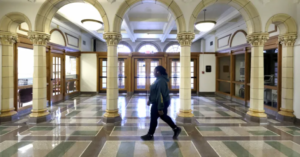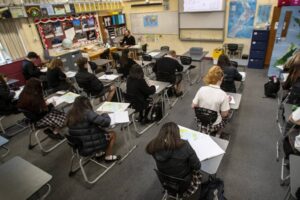Overhaul of Colorado school funding may be in the works
3 min read
Hoping to succeed where its predecessors failed, a special legislative committee would examine Colorado’s public school funding system and recommend improvements under a bill that received unanimous approval in the House Education Committee Thursday.
The legislative committee would meet for two years and recommend changes on everything from how to best identify students in poverty to how to make up for vast differences in property wealth and taxing capacity among school districts.
A previous special committee met for three years without producing legislation. Nonetheless, state Rep. Julie McCluskie, a Dillon Democrat who served as chair of the previous committee and sponsored this bill, said the earlier debates helped build agreement on key topics, such as targeting more money toward students with more needs.
Now the pandemic has motivated legislators to make real change, she said.
“Because of COVID, there is such strong evidence that we need to make changes to our school funding system to make it more transparent, more student-centered, and more equitable,” McCluskie said.
The legislature already has moved to expand the definition of students in poverty and increase funding for students learning English by 8% per student starting next school year. Those provisions — originally part of the same bill that would create the special committee — instead were added to the School Finance Act this week. That change consolidates funding changes for the 2021-22 school year in a single bill that passed the House, also on Thursday. The legislature is set to wrap up the session next week.
The changes in the school funding formula will give districts an extra $118 million next school year and guarantee additional funding going forward. Colorado has more money to put toward education because separate legislation gradually raises local property taxes. The Colorado Supreme Court signed off on the plan late last month.
A more controversial provision of the original bill would have created a state matching fund to encourage school districts with low property wealth to pass modest local tax increases to support their schools.
Differences in property wealth mean a mill — one dollar for every $1,000 of assessed value — can generate anywhere from $20,000 to $19 million depending on the district. It can be harder to pass tax increases in poor districts — and when they do pass, they don’t make as much difference for students.
Now, the local tax question will be one of several that the special committee is charged with studying and making recommendations.
- whether Colorado should find a new ways to count how many students live in poverty instead of relying on applications for subsidized lunches
- whether school districts should get additional money for every student with a disability
- how to account for factors like high cost of living or the unique challenges of rural districts
- how to fund state-authorized charter schools and multi-district online schools.
House Bill 1325 would create an eight-member committee, evenly divided between Democrats and Republicans, representatives and senators. Lawmakers will also aim for representation of urban, suburban, and rural school districts. If successful, the committee would recommend changes in the 2023 legislative session.
“We have the opportunity to make a difference in how we fund our schools,” McCluskie said. “With this bill, we have two years to get it right.”
While Democrats control both chambers of the legislature, the committee could end up recommending legislation in a different political environment. McCluskie said a bipartisan approach is critical to crafting legislation that provides the best solutions. And the school funding debate also doesn’t always break along neat partisan lines. Lawmakers listen to local school leaders in their legislative districts, and depending on what changes are proposed, some districts will do better than others.
The bill sets aside $90 million the state education fund to help with the transition to a new formula.
The proposal to form a new special committee received an enthusiastic bipartisan reception in the House Education Committee. The bill goes next to the appropriations committee before going to the full House.
This article was originally posted on Overhaul of Colorado school funding may be in the works







